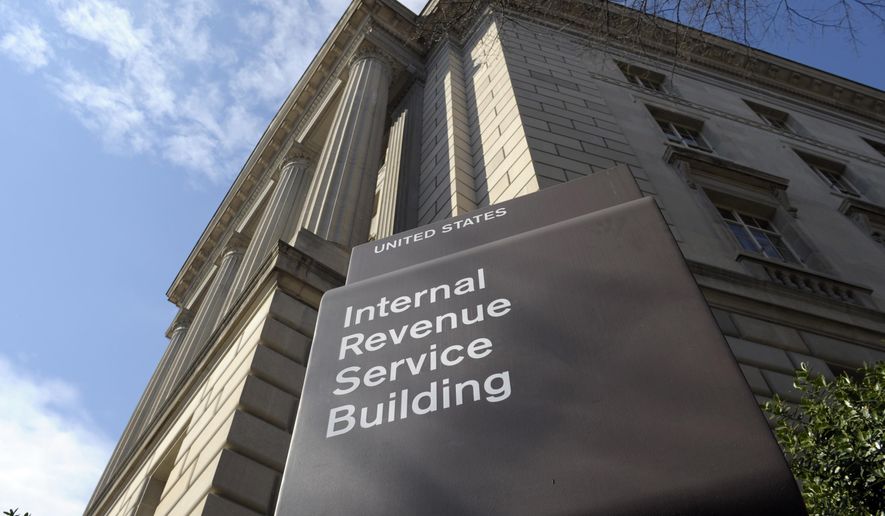Daniel Werfel pledged Wednesday that if he is confirmed by the Senate to become the next commissioner of the IRS, the tax agency will not use its $80 billion funding boost from Congress to go after households making less than $400,000 per year.
The Biden nominee told lawmakers during his confirmation hearing before the Senate Finance Committee that he is “committed to meeting” a directive from Treasury Secretary Janet Yellen that the Internal Revenue Service will not increase audit rates — relative to historic levels — for small businesses and households bringing in under $400,000.
“Therefore, if I am fortunate enough to be confirmed, the audit and compliance priorities will be focused on enhancing IRS capabilities to ensure America’s highest earners comply with applicable tax laws,” Mr. Werfel said.
His testimony comes amid intense scrutiny from Republicans that Democrats’ funding windfall under their tax-and-climate-spending law — dubbed the Inflation Reduction Act — will hurt middle and lower-income earners. More than half the new money, roughly $46 billion, is intended for tax compliance efforts, which Democrats say will be used to target some of the nation’s wealthiest tax cheats at the individual and corporate levels.
The rest of the funding is meant to bring the IRS into the digital age by upgrading its decades-old technology and chipping away at its backlog of processing tax returns.
Mr. Werfel cited the desire to “achieve equity” among those who are audited. He suggested there is a bias toward lower-income earners amid a longtime lack of funding and staffing that make it difficult to claw back unpaid taxes from wealthier individuals or companies with the resources to fight audits.
“If poor people are more likely to be audited than wealthy, that is something that I think potentially degrades public trust and needs to be addressed within the tax system,” Mr. Werfel said.
Republicans said their fears about the IRS balking on its $400,000 audit threshold pledge stem from the lack of explicit directive under the law, giving Biden administration officials wide discretion.
“Because the funding lacks any accountability measures or guardrails, the next IRS commissioner shoulders the primary responsibility for outcomes, as well as planning, tracking spending and transparently monitoring outcomes,” said Sen. Mike Crapo, Idaho Republican and the panel’s ranking member. “Given how the funding was conceived, designed and adopted, I am skeptical.”
Mr. Werfel, 51, has been nominated to replace Charles Rettig, a Trump appointee who left when his five-year term ended in November.
An acting commissioner has been filling in.
A managing partner at Boston Consulting Group and a former acting IRS commissioner and ex-U.S. Office of Management and Budget employee, Mr. Werfel sought to assuage such transparency concerns by vowing to disclose details on how the agency spends its influx of $80 billion.
“I really want to earn this committee’s trust, and I think as a former budgeteer, I will earn your trust by putting together a very clear plan that articulates where the money is going,” Mr. Werfel said.
But his assurances failed to quell concerns over the $400,000 auditing threshold, even among Republicans such as Sen. Thom Tillis of North Carolina, who said he will vote to confirm Mr. Werferl.
“The $400,000 cap isn’t very consoling to me,” Mr. Tillis said. “The small business man I spoke to weeks ago with three service trucks, the wife as the CEO and CFO, they’ve got a million dollars in income they’ll have to report. I think it’s a cop-out to say the $400,000 limit means that the little guy shouldn’t mind.”
Pressed by Sen. James Lankford, Oklahoma Republican, about his stance on new IRS rules for reporting transactions through platforms such as Venmo and PayPal totaling more than $600, Mr. Werfel was ambiguous.
“Paperwork burden, intrusion, what is the right balance? I’ll start with the law. What does the law expect us to do?” he said. “I’m open to a lot of different options. The bottom line is always: What will build trust with the taxpayers?”
The latest blowback toward the IRS came last week after the agency said it plans to crack down on the tips made by service industry workers, such as waiters and waitresses, with a new reporting program.
“This is a shakedown of small business operators and middle-class families to pay for expensive partisan policies, and it just gets very, very bothersome to read this new report that the IRS has proposed a revenue-producing procedure this week to crack down on the service industry’s reporting of tips,” said Sen. John Barrasso, Wyoming Republican.
Senate Finance Committee Chairman Ron Wyden, Oregon Democrat, promised that the program would remain “voluntary” with “no mandates” and that restaurants may want to use it to comply with existing tax laws.
“On my watch, I assure my colleagues this is not going to be a mandatory program,” he said.
• Ramsey Touchberry can be reached at rtouchberry@washingtontimes.com.




Please read our comment policy before commenting.